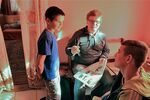More than a Study Program

The theological education of future pastors in Eastern Central Europe and in the Balkans is an important priority – and a significant challenge as the UMC does not have the financial and personnel resources to establish institutions that provide a full theological education in any of these countries.
For many years the theological students from the countries in Eastern Central Europe were sent to institutions in Western Europe. It has now been agreed that students from these countries should complete their foundational theological education in an institution in their own country – thus for example in an Evangelical Lutheran seminary or a Bulgarian Orthodox faculty. This has significant advantages in relation to language, inculturation and costs. In 2008 the Methodist e-Academy was launched to provide a specifically Methodist supplement to this foundational education. This is future orientated program; it brings together students from all over Europe using contemporary communication tools (e-learning and virtual classrooms) combined with short block seminars. The program offers six modules focusing on Methodist history; Methodist theology and ethics, and Methodist perspectives on the church and its mission. The courses are offered in German and English. At present there are 25 students from twelve countries.
The e-Academy understands its calling a part of the vision to develop dynamic congregations that spread the message of God’s transforming love through their words, by the example of their community life and through their actions in society. The success of this Europe wide program has been seen, amongst other things, in the way that students of program have been inspired to develop e-learning programs in their own countries to provide education for local pastors and lay preachers. At present this is happening in Finland, the Czech Republic and Bulgaria. Furthermore the e-Academy has attracted attention within the ecumenical context and in Methodist institutions in other parts of the world as a model for theological education.
The European dimension of the e-Academy has other very different consequences as can be seen in the example of Bernfried Schnell, pastor of the UMC congregation in Bregenz, Austria. As part of his internship as a pastor he is completing the Methodist e-Academy program. He is enthusiastic about the exciting and beneficial possibilities of getting to know pastors from other countries and to experience something of their culture. In order to share these horizon expanding experiences he organized a ten day journey to Bulgaria and Hungary. On the 25th September 2013 the group of three people left Austria with «baggage» containing 56 chairs, four large used tables and many other used and new goods. The goal of the journey was the UMC congregation in Svishtov (Bulgaria), whose Pastor Vladimir Zhelezov is a student with Bernfried Schnell at the e-Academy. They stopped overnight at the UMC congregation in Szolnok (Hungary). It is not really surprising that the pastor there, Laszlo A. Khaled, is also a student at the e-Academy. When they arrived in Svishtov, the church furniture was offloaded and set up. Over the next few days the visitors helped with renovating the church building. Amongst other things they broke through a wall in order to put in a window and a door. The congregation was very happy with the visit and the furniture. Before they left in order to visit the congregations in Dobrich and Schumen the guests joined with the congregation in a beautiful worship service. On the way home the group spent another day in Abony in the area of Szolnok where they got to know the Methodist work amongst the Roma population there. They visited people in their homes where they gained an insight into the lives of the people and experienced a great openness and friendliness. They were surprised to discover that it was normal for children to learn German at school. The children proudly read from their German school books for the Austrian visitors. Pastor Bernfried Schnell’s evaluation of this journey, that will not be the last of its kind, was: «After the 4000 km journey we arrived back safely, we were exhausted but had many good and vivid experiences. We thank God for all we experienced, for the widening of our horizons and for his protection.»
Source: Bishop Patrick Streiff, Zurich / David Field, Basel / Bernfried Schnell, Bregenz
